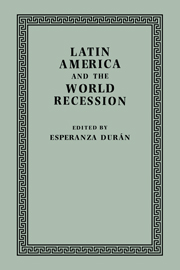Book contents
- Frontmatter
- Contents
- Contributors
- Preface
- 1 The Political Setting: ‘Business as Usual’ or a New Departure?
- Part One The Global Perspective
- Part Two Case Studies
- 5 Brazil's Foreign Debt: The National Debate
- 6 Mexico: Learning to Live with the Crisis
- 7 The Rise and Fall of the Chilean Economic Miracle
- 8 Venezuela: The Oil Boom and the Debt Crisis
- 9 World Recession and Central American Depression: Lessons from the 1930s for the 1980s
- 10 Conclusion
- Index
8 - Venezuela: The Oil Boom and the Debt Crisis
Published online by Cambridge University Press: 05 February 2012
- Frontmatter
- Contents
- Contributors
- Preface
- 1 The Political Setting: ‘Business as Usual’ or a New Departure?
- Part One The Global Perspective
- Part Two Case Studies
- 5 Brazil's Foreign Debt: The National Debate
- 6 Mexico: Learning to Live with the Crisis
- 7 The Rise and Fall of the Chilean Economic Miracle
- 8 Venezuela: The Oil Boom and the Debt Crisis
- 9 World Recession and Central American Depression: Lessons from the 1930s for the 1980s
- 10 Conclusion
- Index
Summary
Venezuela is not a typical Latin American country; it is that rare phenomenon, a democracy that has survived for more than a quarter of a century. But, like most Latin American countries, its history is made up of a series of civil wars, constitutions, short-lived regimes and long dictatorships. From 1935 to 1945 the country was governed by two moderate reformist regimes, which, together with a short-lived populist administration in the immediate post-war period, provided an interlude before one of Venezuela's most repressive dictatorships: that of Marcos Pérez Jiménez, which held power for the whole of the decade 1948–58.
The Venezuelan economy underwent a significant transformation in the 1920s, from being centred on agriculture to becoming an important oil producer, in fact the first oil exporter on a grand scale, even before Saudi Arabia achieved this status. Since then, oil has played an increasingly important role, not only in economic but also in political terms: it became the stabilizing factor during the last two dictatorships of the twentieth century, and also a fundamental element in consolidating the post-1958 democratic process. Venezuelan democracy would not have been able to survive without the revenues derived from oil exports, which enabled the country to support an affluent society. The Venezuelan state has acted as the distributor of wealth, and different social strata have received a share of it. In recent years, however, income distribution has favoured capital rather than labour and has tended to concentrate on the upper layers of the population.
- Type
- Chapter
- Information
- Latin America and the World Recession , pp. 120 - 129Publisher: Cambridge University PressPrint publication year: 1985
- 1
- Cited by



